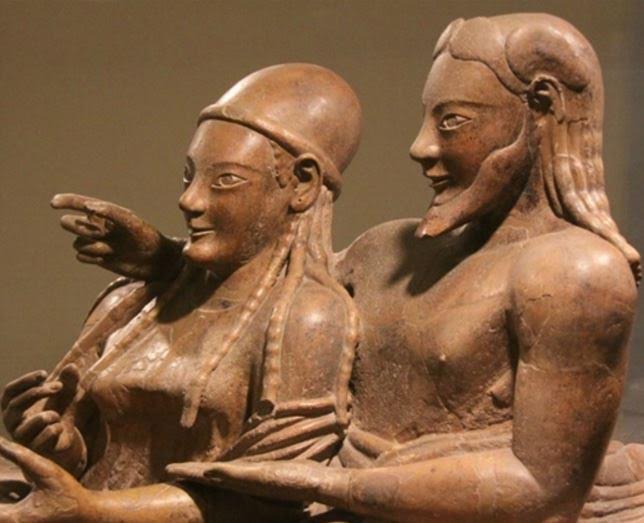
Recently, while excavating piles of my research on various topics, I unearthed some photos from a vacation in Tuscany back in 2002. These photos were of an Etruscan tomb just outside Castellina in Chianti.
The site was simple and unassuming, but it had a great impact on my imagination, so much so that I used it in some parts of Children of Apollo and Killing the Hydra. On that trip, I started to learn more about the Etruscans who inhabited the Italian peninsula from roughly the Tiber to the Arno rivers and beyond, to the Po valley and Bologna.
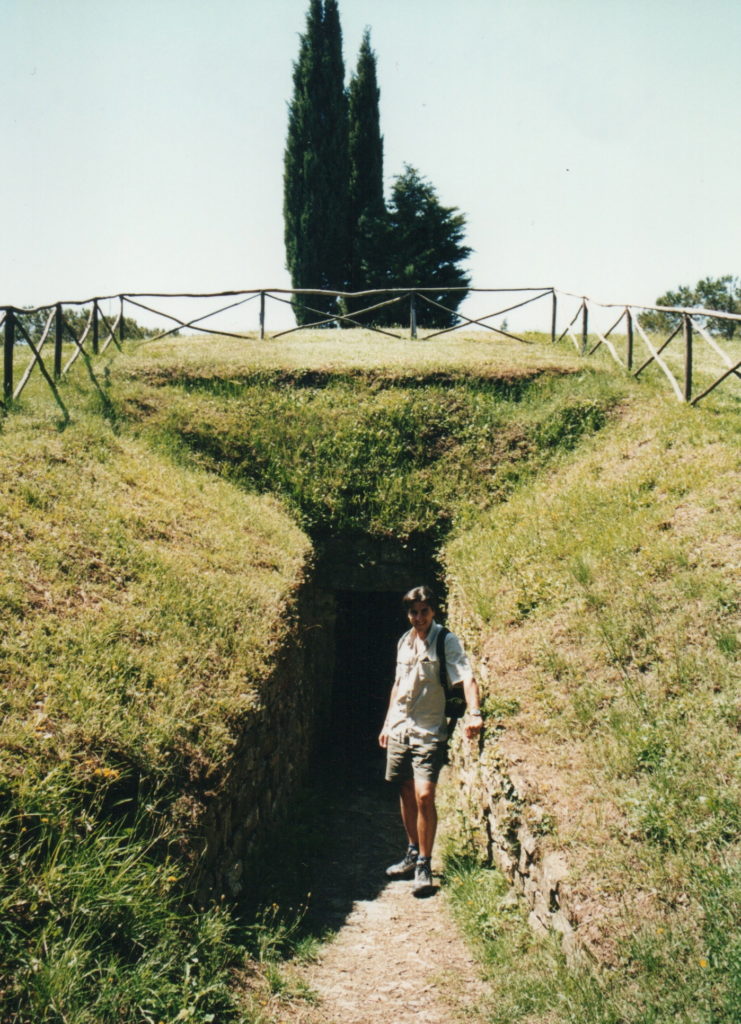
Going into the Etruscan tomb at Castellina in Chianti
So, my interest rekindled, I thought I would write a quick post on this fascinating people.
Not a great deal is known about the Etruscans, and I am by no means an expert, but from what I have seen and read, it’s a very interesting topic. Anyone who has studied ancient Greece and Rome will have had some contact with the Etruscans; the Greeks traded with them and were a great influence on Etruscan art and lifestyle, and Rome itself was ruled by Etruscan kings who brought that little backwater village by the Tiber out of the mud with a dash of civilization. In Tuscany itself, there are many sites where one can find remains of Etruscan civilization, places such as Cerveteri, Veii, Tarquinia, Volsinii, Volterra, Vulci and Arezzo.
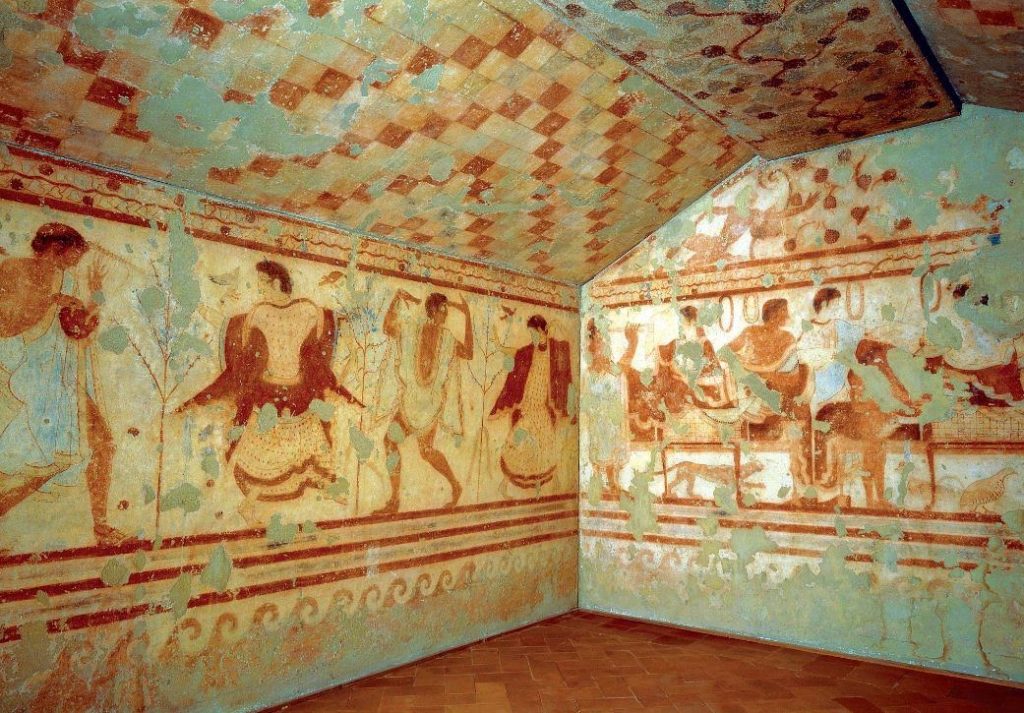
Interior of an Etruscan tomb
Much of what is known about the Etruscans and their lifestyle comes from their tombs where elaborate paintings of banquets and sporting events such as the Olympics have been found. Many grave goods have been found in the tombs and there is an excellent collection of finds at the Archaeological Museums of Bologna and Florence.
The Etruscans traded a great deal, and so had much contact with the Greeks from other parts of Italy, Sicily and mainland Greece. The walls of the tombs depict chariot races and elaborate banqueting scenes with diners reclining on couches, drinking wine from kraters and being entertained by musicians. The scene is like many an ancient Greek depiction with one marked difference: in Etruscan art, women were shown dining right alongside the men, drinking wine and enjoying conversation. This would have been scandalous to an ancient Greek, as women the other side of the Ionian sea were not permitted to be in attendance at banquets or symposia.
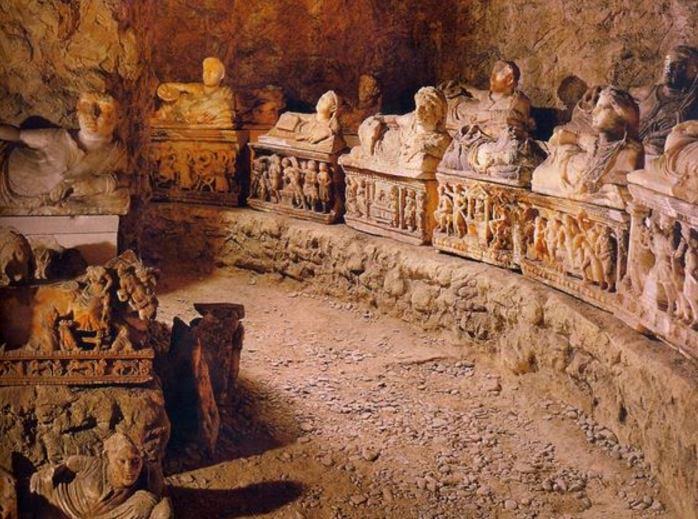
Etruscan tomb of large family from Volterra
The Etruscans had their own rich culture and this is reflected in much of their bronze artwork and pottery. While some of it resembled ancient Greek art, or indeed was Greek art acquired through trade, much of it is quite unique. An excellent example of this is the famous bronze Chimera of Arezzo on display at the Florence Archaeological Museum.
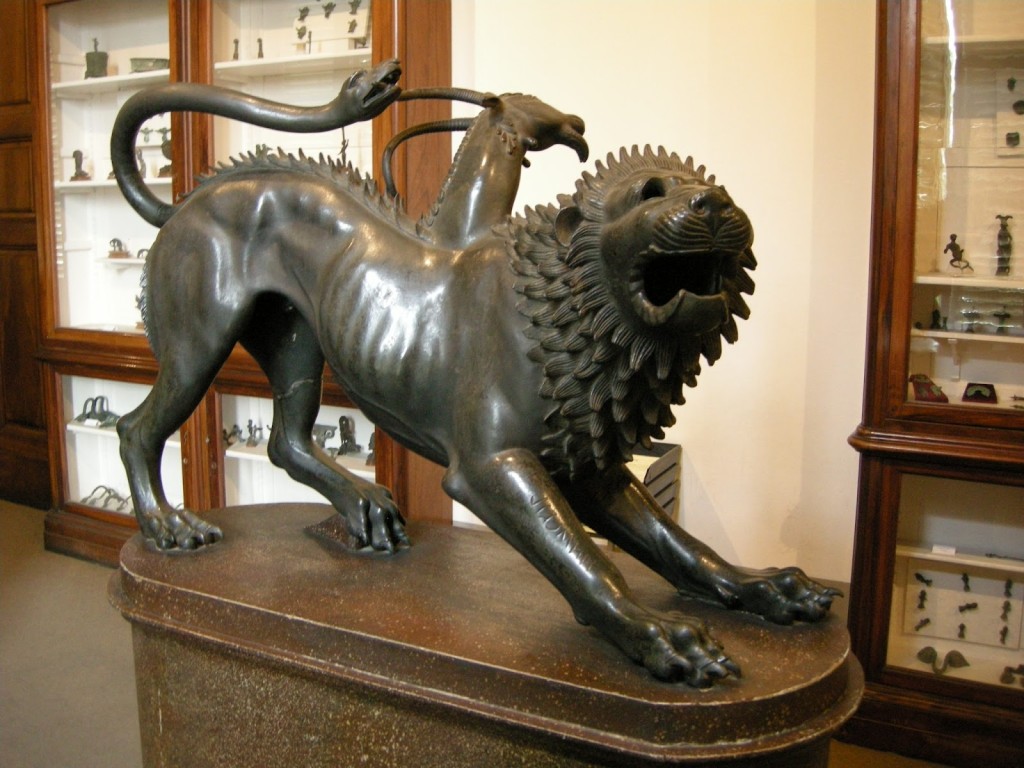
Chimera of Arezzo
There is much debate about the origin of the Etruscans in Italy with no consensus yet in sight. Some believe the Etruscans were an indigenous people, others that they came from Lydia in Asia Minor. As far as the Roman scene was concerned, the line of Etruscan kings began circa 616 B.C. with the reign of Tarquin the Elder who was a Corinthian Greek named Lucumo who lived in Tarquinia and married an Etruscan woman named Tanaquil. The two were shunned for a mixed marriage and so moved to the growing centre of Rome where Tarquin became the fifth king of Rome.
The Etruscans were famous for their understanding of augury and prophecy, religious practices which would be widely used in Roman life for hundreds of years. Etruscan augurs would read portents and the will of the gods in animal entrails and organs, and this skill impressed the Romans. The Etruscans not only complemented Roman religious practices, but also helped to improve Roman building practices and it is to them that the Romans owe their talent for building aqueducts and sewers.
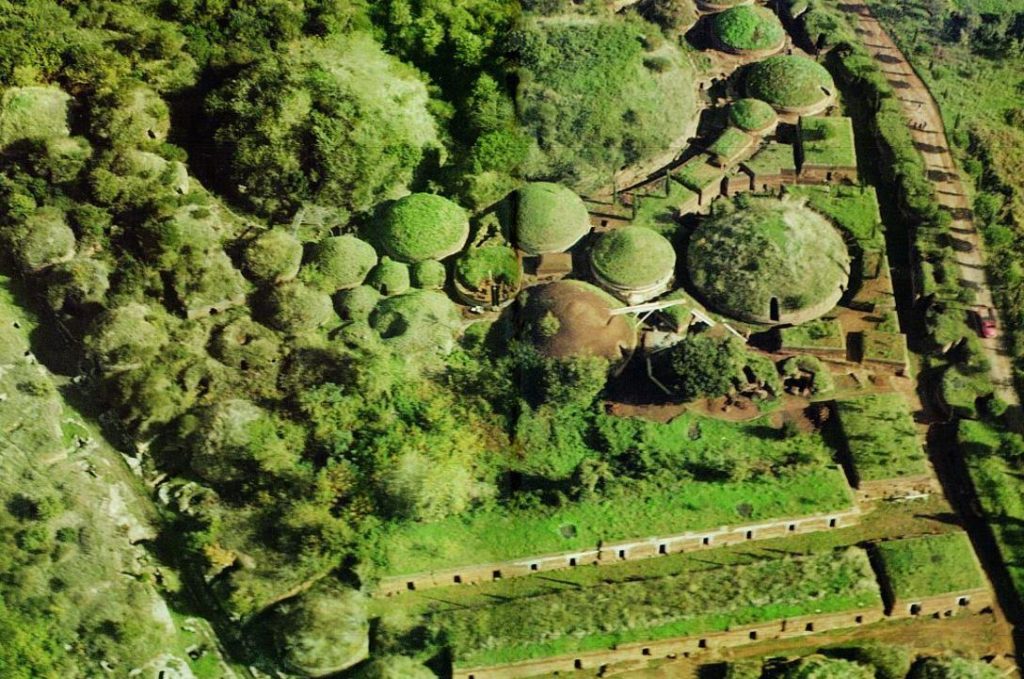
Etruscan necropolis at Cerveteri
At the peak of their power and influence, the Etruscans were the dominant people of central Italy. They were however, never a truly unified nation and, like the Greeks who had influenced them and traded with them, their city-states never stopped fighting amongst themselves. With the Romans growing in strength and skill to the South, and the Celts expanding in the North, the Etruscans were in a superbly unenviable position and could not hold sway for long.
The last Etruscan king of Rome, Tarquin the Proud, who according to Livy took the throne by force and ruled through fear, was narrowly defeated in a series of battles between Etruscan allies and the Romans, led by Lucius Iunius Brutus. Many died on both sides, but Tarquin lived through the day and, though no longer King of Rome, lived out his days in exile in Tusculum. The wheels had been set in motion and Rome had become a Republic.

Tarquin the Proud (Wikimedia Commons)
Of course, when I walked into the cypress-crowned tomb outside Castellina in Chianti years ago, I knew nothing of Etruscan history, nor how fascinating it really is. This short blog post is a tiny scratch on the surface, a mere taste – there is so much more to learn. There are not many books (fiction or non-fiction) on the subject, at least not in English. As far as historical fiction/fantasy, two great reads are Steven Saylor’s Roma, part of which takes place during Rome’s infancy, and the other book is Ursula K. Le Guin’s wonderfully woven tale, Lavinia, which looks at the mythical foundation of Rome with the arrival of Aeneas after the Trojan War.
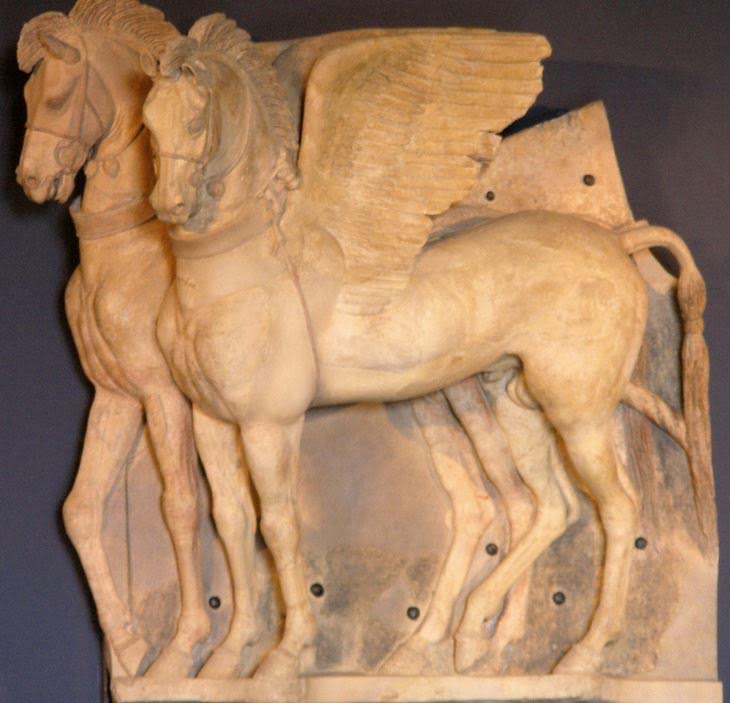
Winged horses from Tarquinia
If you ever find yourself in Italy, I highly recommend the archaeological museums of Florence and Bologna where you can see Etruscan artefacts for yourselves, and it goes without saying that visits to the archaeological sites mentioned are well worth the adventure. Just remember that snakes, as well as tourists, like nothing more than a dark, damp tomb in summer time.
Thank you for reading.
*If anyone has a favourite source for information on the Etruscans, please do share it in the comments below so that everyone can check it out!
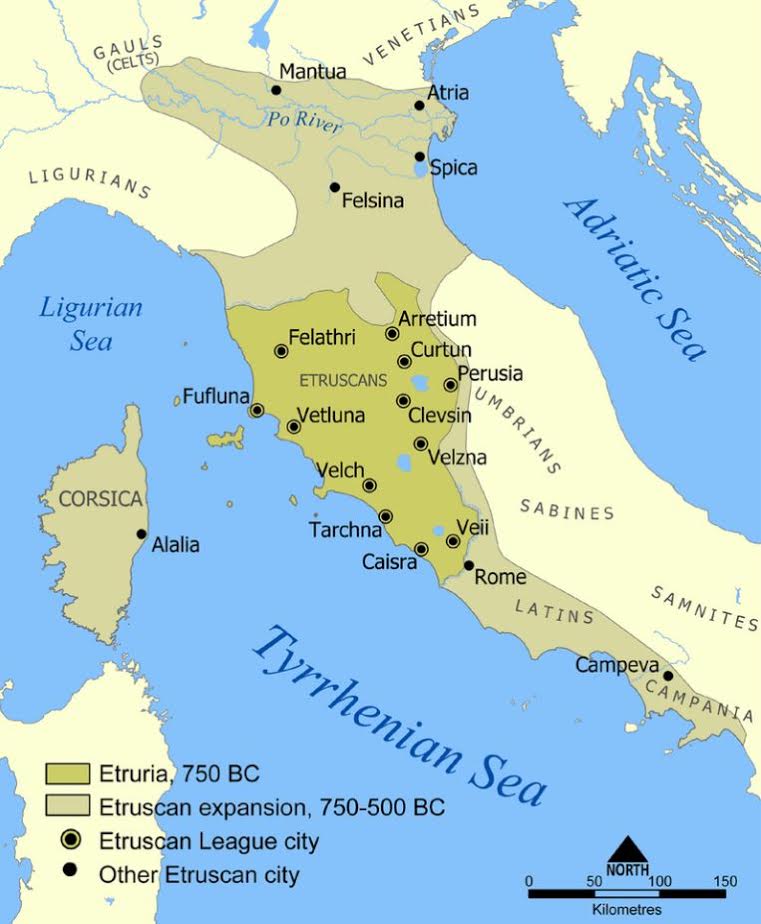
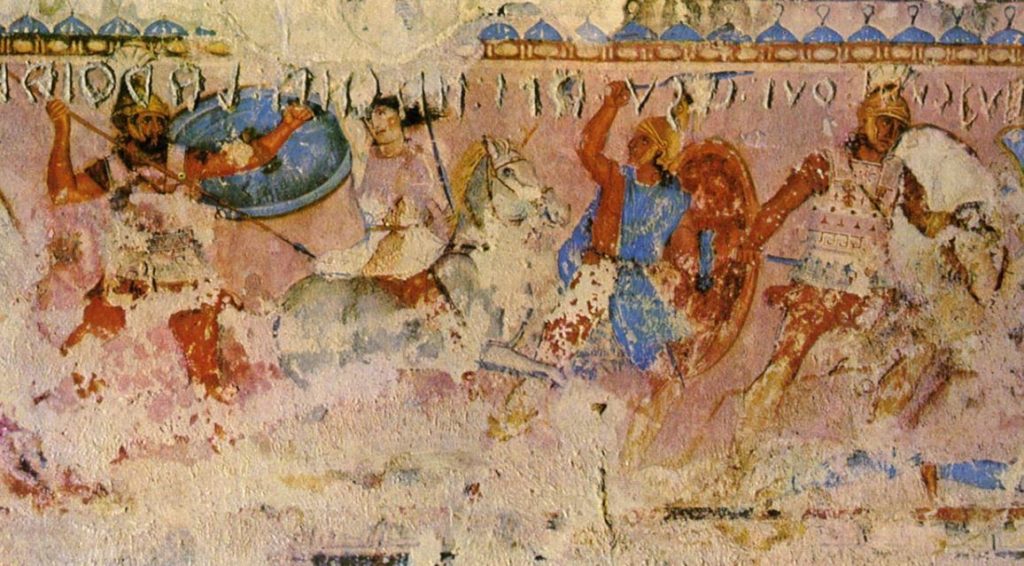
Etruscan tomb fresco from Tarquinia (c. 400) – Greeks fighting Amazons













Thank you so much for educating me about the Etruscans. A very interesting article. As you will know, Claudius wrote a book about the Etruscans. What a pity it’s not extant.
You’re welcome, Lin. I’m happy you enjoyed this one. I recently read that about Claudius’ book – so sad it did not survive 🙁 I also found out recently that there is a fantastic Etruscan museum in Rome so that is on my list the next time I’m there! Cheers and thank you for your comment. Happy Spring!
Emperor Claudius was the last person who can speak and write in Etruscan language, unfortunatelly this knowledge died with him
Hi Adam
The Etruscans are one of my favorite subjects within ancient Italy.
They were part of a widespread trading network in ancient times. Carthage (another of my favorite subjects), which was settled in North Africa by people from Tyre in the Levant, within sailing reach of Sicily and Sardinia, allied with the Etruscans c 535 BC to fight against the Phocaean Greeks who had settled in Corsica, and defeated them.
Bronzework and pottery from Etruria has been found in Sardinia and Sardinian goods have been found in Etruria as well. Carthage also had settlements in Sicily and in Sardinia, and evidence of Carthaginian merchants exists in the Etruscan city of Caere.
Two very good books I recommend are “The Etruscan World” by Jean Turfa and Etruscan Civilization a Cultural History by Sybille Haynes.
Some information on the Regolini-Galassi tomb, one of the so-called “Princely tombs” of the Etruscans, dated to the mid 7th century I think, can be perused here at https://regolinigalassi.wordpress.com/2011/07/12/a-strange-fibula/.
I definitely think the Etruscans should get more air time! It’s a wonderful subject. Thanks for sharing your source recommendations, Marie. Will have a look for sure!
Same I really enjoyed reading it. I love ancient Rome, and would love to learn more about the Etruscans. Too bad Rome was sacked and Dark Ages came. I imagine the world would be a different place.
I often wonder what the world would have been like if the Roman Empire still existed. Glad you enjoyed the post, Kevin! Cheers 🙂